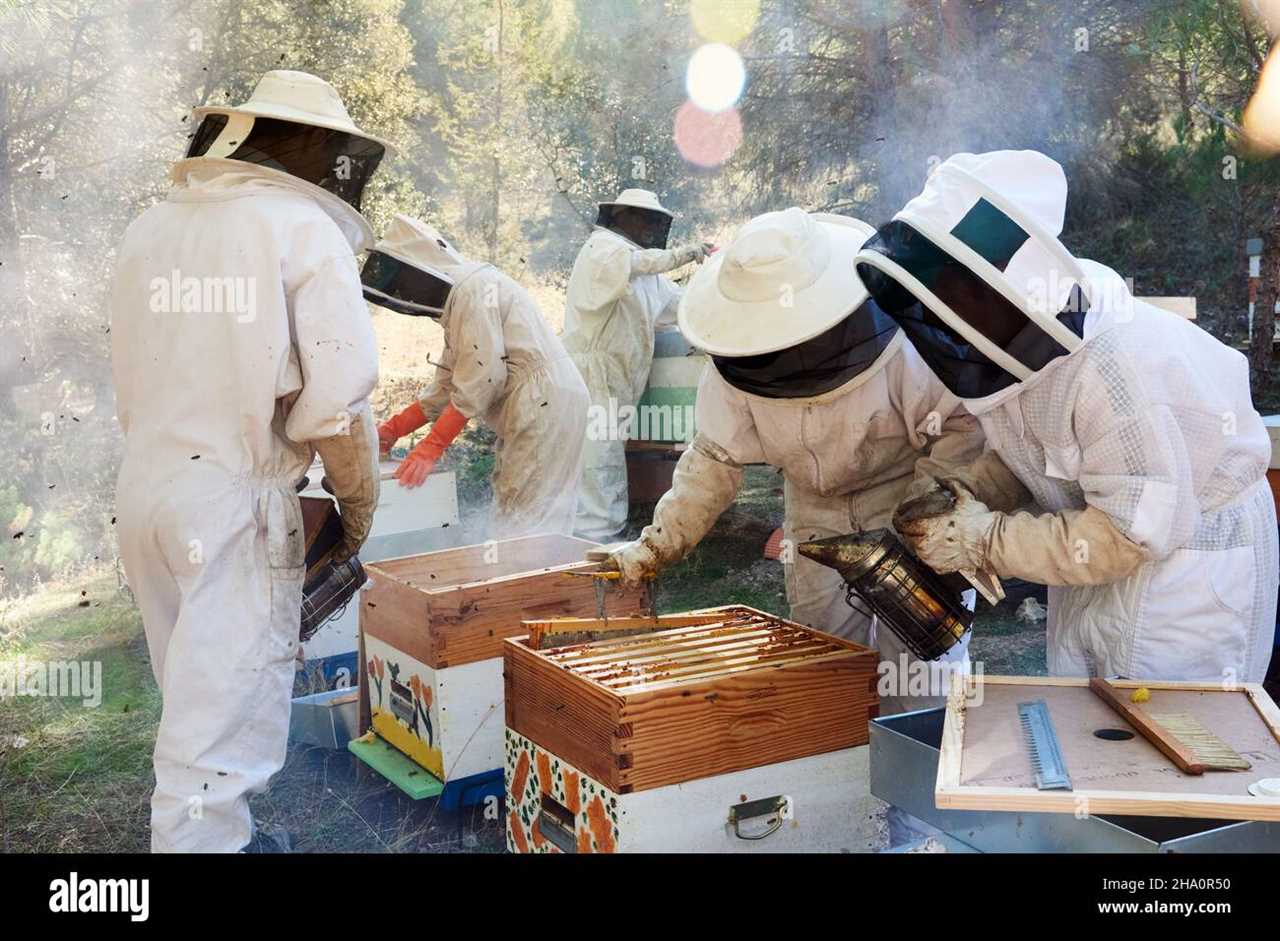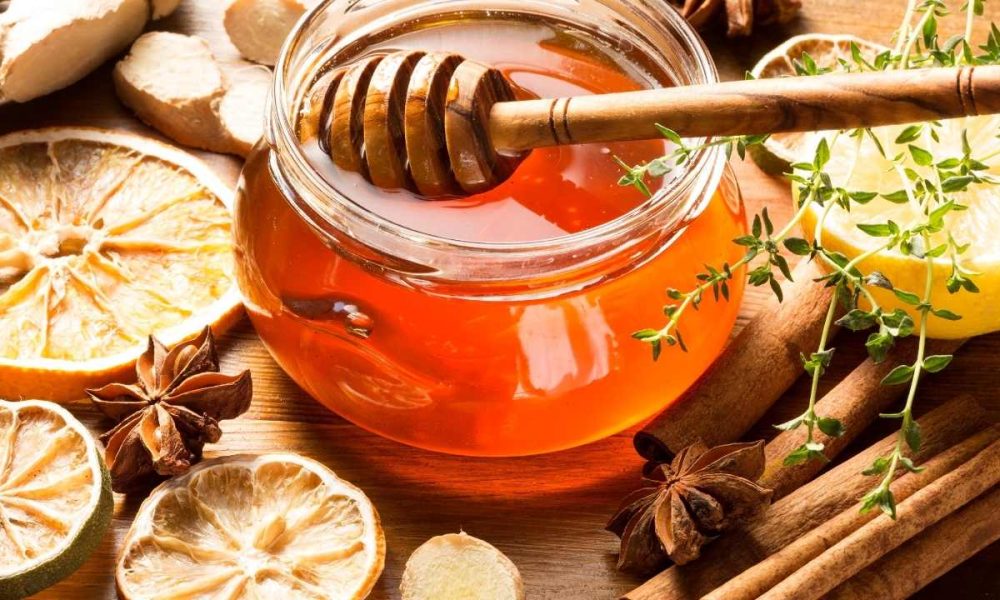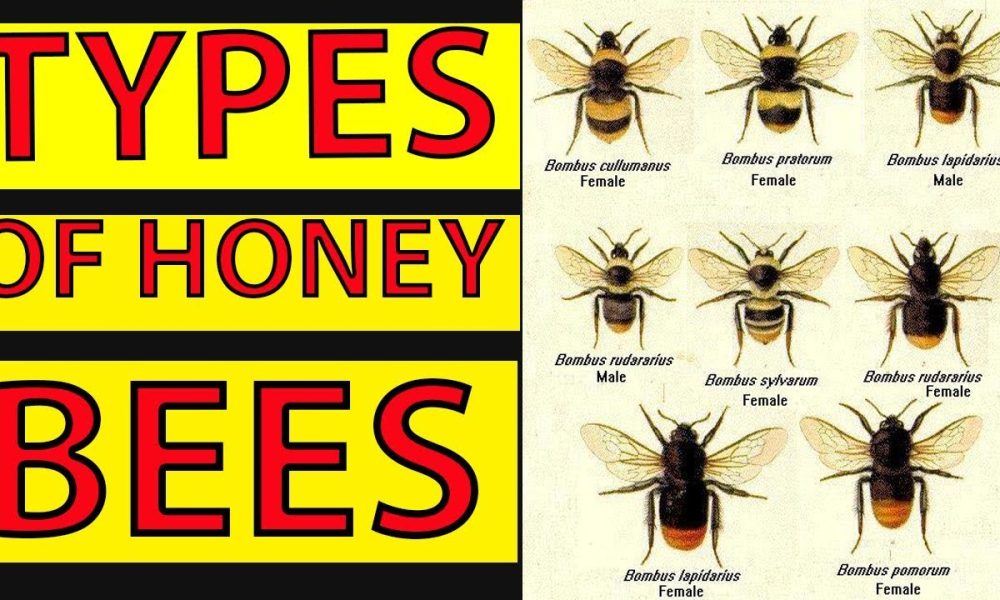
Are you aware of the sweet science behind pollination and honey production? These two natural processes play a crucial role in our ecosystem and have numerous benefits that extend far beyond simply providing us with honey. By increasing pollination rates, we can not only improve crop yields but also enhance biodiversity, support wildlife, and even mitigate the effects of climate change.
Honey production, on the other hand, is not just about satisfying our sweet tooth. It has economic benefits for farmers and communities alike as well as potential health benefits for humans. In this article, we will delve into the intricacies of pollination and honey production to uncover their fascinating benefits. So get ready to learn about how these two sweet sciences can serve both ourselves and others.
The Importance of Pollination
Pollination is crucial for ensuring the growth and reproduction of many important plant species, making it a vital process for sustaining our ecosystem. By transferring pollen from the male to the female parts of flowering plants, pollinators such as bees, butterflies, birds, and even bats play a critical role in producing fruits, nuts, seeds, and other food sources that sustain not only wildlife but also humans.
Moreover, pollination benefits extend beyond food production. Pollinators contribute to ecosystem health by promoting biodiversity preservation. They help maintain healthy populations of plants with different shapes, colors, fragrances, and textures that provide habitat and shelter for countless animal species. Without pollinators’ services that are estimated to be worth billions of dollars globally each year, our planet would lose much of its natural beauty and resilience. Thus understanding the importance of pollination is essential if we want to protect our environment for future generations.
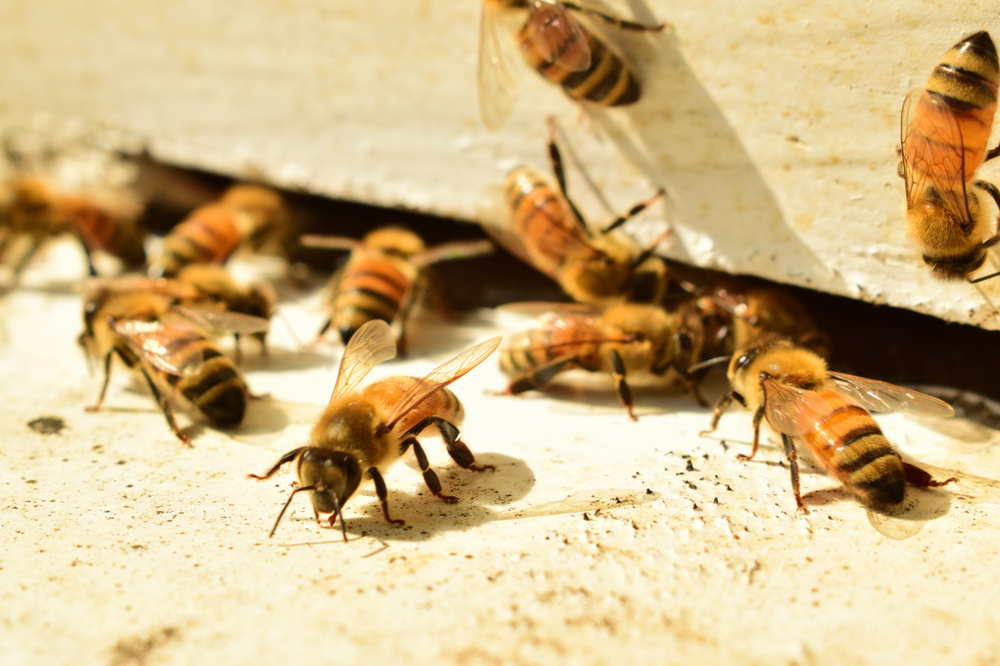
By increasing pollination rates through various means such as planting more native flowers or providing nesting habitats for bees and other beneficial insects can have numerous positive effects on both ecological and economic systems worldwide.
The Benefits of Increased Pollination
When it comes to the benefits of increased pollination, you’ll be happy to know that there are many advantages that you can reap. First and foremost, higher crop yields are one of the most important benefits. With more pollinators around, your crops will thrive and produce more fruit or vegetables than ever before. Secondly, better-quality produce is another benefit that cannot be ignored. When crops are properly pollinated, they tend to be larger in size, have a better texture, and taste much sweeter than those that aren’t pollinated as effectively. Lastly, environmental benefits come into play as well. More pollinators mean a healthier ecosystem overall since these creatures help keep the natural world balanced by maintaining plant populations and encouraging biodiversity in an area.
Higher Crop Yields
You’ll be pleased to know that crop yields can improve significantly with more bees buzzing around, leading to a bounty of fresh fruits and veggies for all. This is due to the fact that bees are natural pollinators, and as they go from one flower to another, they transfer pollen grains which lead to fertilization. Improved farming techniques coupled with efficient harvesting means that crops grow faster and in greater quantities when there are plenty of bees involved. In turn, this leads to higher crop yields which ultimately translate into more food on your table.
In addition to being good news for farmers and consumers alike, increased pollination also has wider implications for the environment. More bees buzzing around means a healthier ecosystem overall, as it supports biodiversity by promoting growth in different plant species. This contributes towards better soil quality and cleaner air too – not bad for such small creatures! So next time you see a bee out and about doing its thing, take a moment to appreciate just how important these little insects are for our planet’s health.
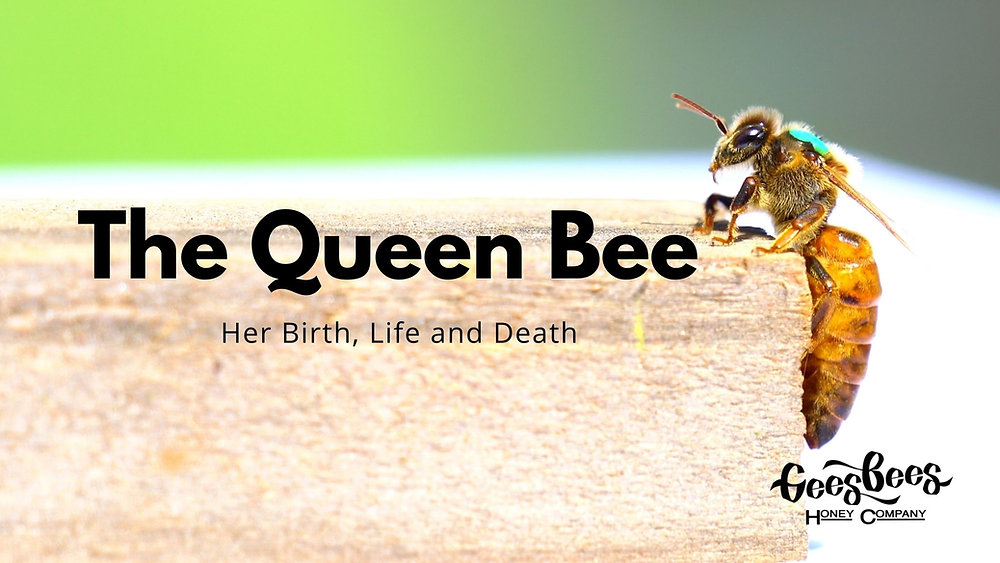
Better-Quality Produce
You may notice that the fruits and vegetables you consume have a richer flavor, texture, and aroma when there are more bees around to pollinate them. This is because increased pollination leads to improved taste and nutrition in produce. When flowers receive adequate amounts of pollen from bees, they develop into larger and healthier fruits or vegetables with a higher sugar content. This results in produce that has a sweeter taste, firmer texture, and more complex aroma.
Moreover, increased honey production can also boost wellness by providing health benefits such as antibacterial properties and antioxidant content. Honey is known for its ability to soothe sore throats, heal wounds faster, and aid in digestion. It also contains compounds that may lower blood pressure levels and reduce the risk of heart disease. All these health benefits make honey an excellent addition to your daily diet, especially when it comes from bees that have been well-nourished through effective pollination practices.
As we’ve seen so far in this article, the sweet science of beekeeping offers many advantages beyond just producing honey. Increased pollination can lead to better-quality produce while at the same time boosting our overall health through increased honey production. But wait – there’s more! In the next section, we’ll explore how these practices benefit not only us but also our environment as a whole.
Environmental Benefits
Discover how beekeeping can positively impact the environment and contribute to a healthier planet. By supporting green initiatives and conservation efforts, bees play a crucial role in maintaining biodiversity. Here are three ways that beekeeping benefits the environment:
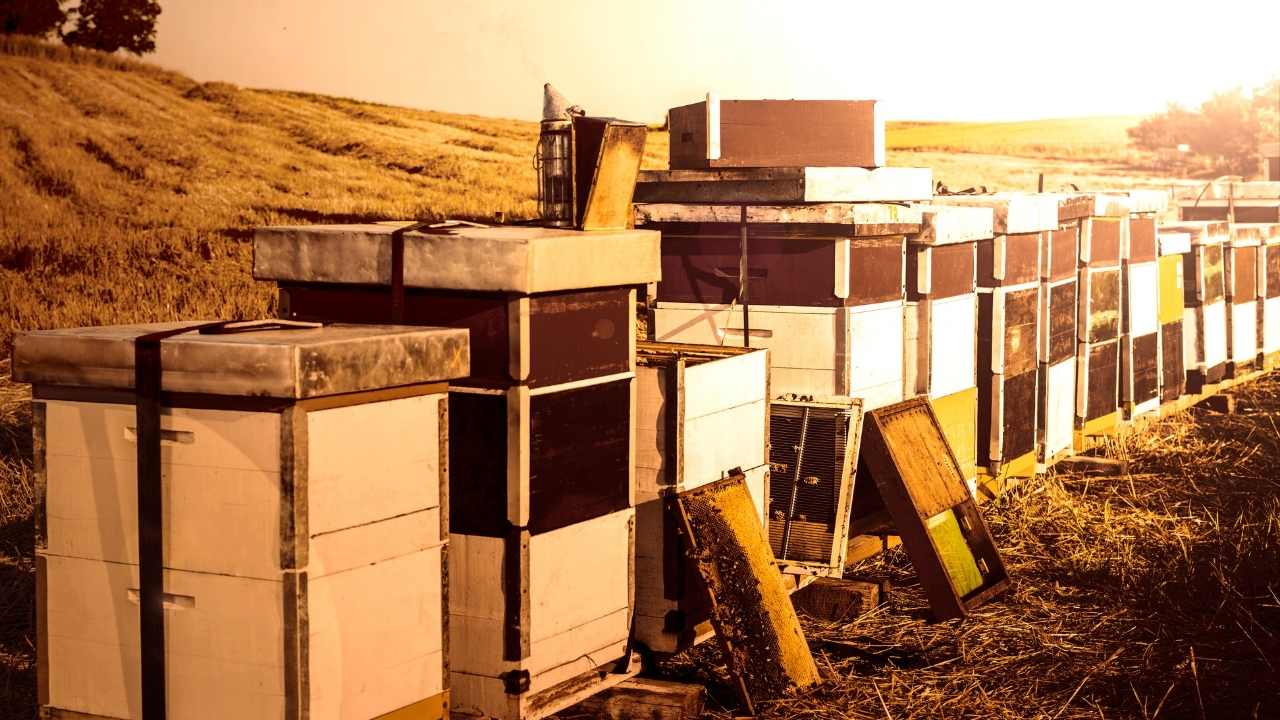
-
Pollination: As bees fly from flower to flower, they transfer pollen grains that fertilize plants and allow them to produce fruit or seeds. This process is essential for crops such as almonds, apples, blueberries, cherries, cucumbers, pumpkins, and watermelons. Without pollinators like bees, many of our favorite foods would become scarce or disappear altogether.
-
Habitat creation: Bees require diverse habitats with flowers for food and nesting sites for shelter. Beekeepers can help by planting pollinator-friendly gardens or creating artificial hives that mimic natural environments. These efforts not only benefit bees but also support other wildlife species that depend on similar habitats.
-
Soil health: Bees indirectly improve soil quality by promoting plant growth through pollination and increasing organic matter through honey production. Healthy soils store more carbon dioxide and release fewer greenhouse gases into the atmosphere, making them an important tool in mitigating climate change.
As you can see, beekeeping has far-reaching environmental benefits beyond just producing delicious honey! Speaking of which, let’s explore the process of honey production in more detail…
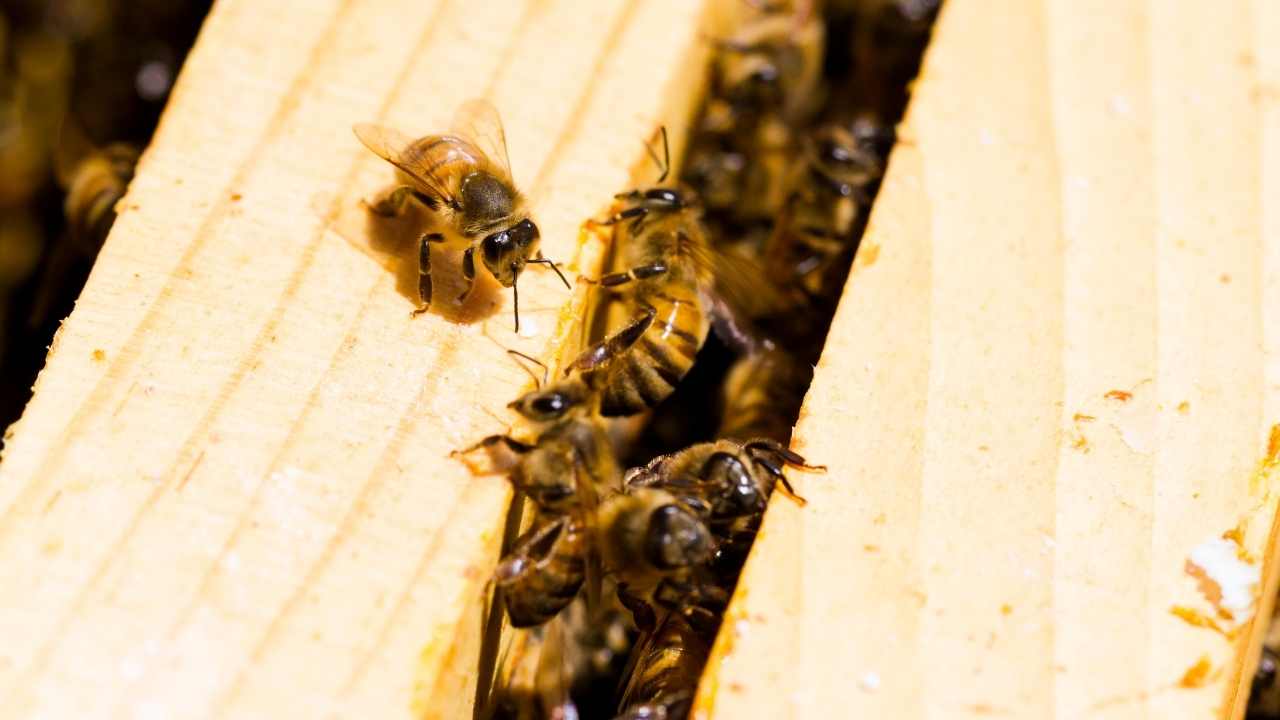
The Process of Honey Production
As you delve into the intricate process of producing honey, you will gain a greater appreciation for the hard work and dedication required to harvest this golden nectar. Harvesting honey requires careful planning and execution to ensure that it is done without harming the bees or damaging their hive. Beekeepers must first observe honeybee behavior to determine when the honey is ready for extraction. The pollination process involves bees collecting nectar from flowers and carrying it back to their hive, where they transform it into honey through a series of enzymatic reactions.
Once the beekeeper has determined that the honey is ready, they begin the extraction process. This involves removing frames from the hive and using a special tool to scrape off any excess wax before placing them in an extractor. The extractor spins the frames at high speed, causing centrifugal force to extract the honey from each cell. After this step, beekeepers filter out any impurities before bottling and selling it as pure, delicious honey. As you can see, there are many steps involved in producing high-quality honey that benefits both us and our environment.
With all these benefits in mind, it’s no wonder that many people are becoming interested in beekeeping as a way to promote sustainability while also reaping economic rewards. Speaking of which…
The Economic Benefits of Honey Production
You’re about to dive into the economic benefits of honey production. You’ll learn how beekeeping provides a sustainable income for beekeepers, supports local economies, and contributes to the growth of the honey industry. With these key points in mind, you’ll gain insight into how honey production is not only sweet for your taste buds but also for the economy.
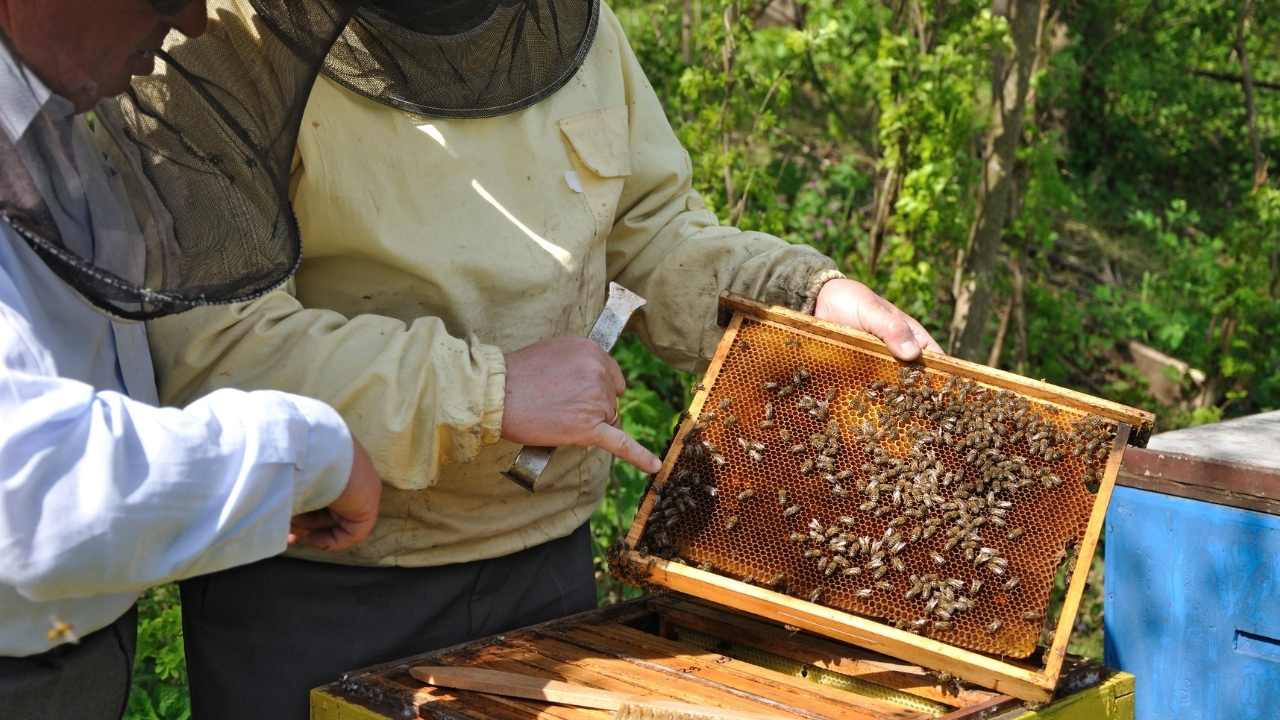
Sustainable Income for Beekeepers
You can earn a steady and sustainable income by keeping bees and harvesting their honey, which provides a source of revenue that can support your livelihood and bring new opportunities for growth. Beekeeping sustainability is key to this endeavor, as it ensures the health and reproduction of bee colonies over the long term. When done properly, beekeeping practices also encourage community empowerment by promoting environmental conservation and education about pollinators.
To ensure success in beekeeping, it’s important to invest in quality equipment and resources that will provide you with a strong foundation from which to build your apiary. This includes hives, protective gear, tools for extracting honey, and knowledge about honeybee biology and behavior. You should also consider joining local beekeeping associations or seeking out mentorship from experienced beekeepers who can offer guidance on best practices for maintaining healthy colonies. By taking these steps towards building a successful apiary, you’ll not only generate income but also contribute to the health of local ecosystems through increased pollination efforts.
In addition to providing sustainable income for individuals, honey production has positive implications for supporting local economies as well. By creating demand for locally produced honey products such as artisanal honeys or beeswax candles, communities can foster economic growth while simultaneously promoting environmental stewardship through sustainable farming practices.
Support for Local Economies
Building a buzzing local beekeeping industry can create a hive of activity for community prosperity. Collaborative partnerships between beekeepers, farmers, and other local businesses can foster economic growth and strengthen the bonds within the community. As more bees pollinate crops, there will be an increase in agricultural yields which translates to higher profits for farmers. In turn, beekeepers can benefit from this increased demand for their services.
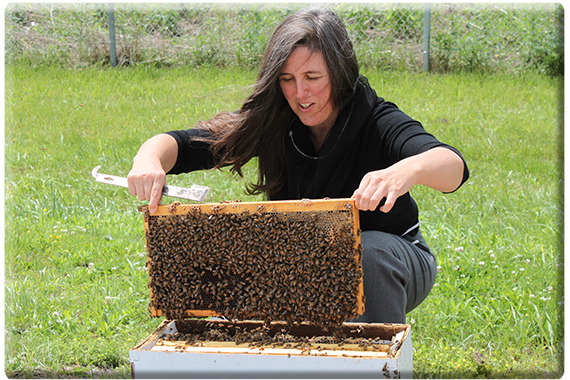
Community engagement is also crucial in supporting local economies through beekeeping. Educating the public on the importance of pollinators and honey production can lead to greater appreciation for these industries. This could result in more individuals purchasing locally sourced honey or even becoming amateur beekeepers themselves. The support of such initiatives creates a ripple effect that benefits not only the local economy but also helps protect natural habitats and ecosystems.
As we explore how collaborative partnerships and community engagement help build thriving local beekeeping industries, it’s important to highlight how growth in the honey industry contributes to this success.
Growth in the Honey Industry
As the demand for local, sustainable food options continues to rise, you may be interested in learning more about how the honey industry has been able to capitalize on this trend and create new opportunities for economic growth. Investment opportunities have led to technological advancements in honey production, resulting in increased yields and higher quality products. This growth in the honey industry has not only provided jobs for beekeepers and other workers, but also supported local businesses such as restaurants and farmers markets.
Four reasons why investing in the honey industry could be a smart move include: 1) Honey is a versatile ingredient that can be used in a variety of products from cosmetics to baked goods. 2) The health benefits of consuming raw honey are becoming increasingly well-known, leading to higher demand for locally-sourced, natural sweeteners. 3) Beekeeping can provide an environmentally-friendly alternative source of income for farmers who may struggle with traditional agriculture practices due to factors such as climate change or soil degradation. 4) Technological advancements have made it easier than ever before for small-scale beekeepers to enter the market and compete with larger producers.
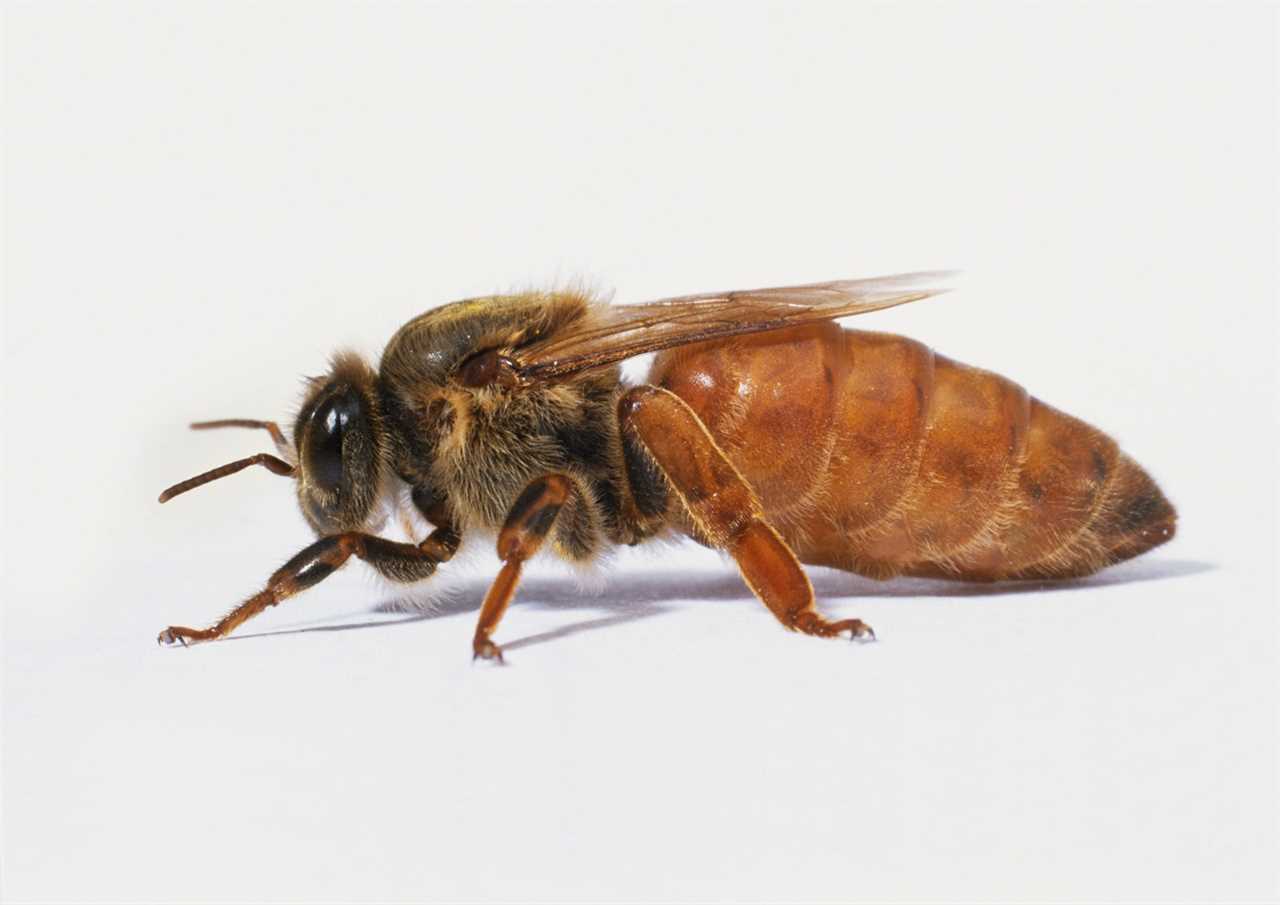
Beyond agriculture: other uses for honey continue to emerge as researchers discover its potential applications in fields such as medicine and construction.
Beyond Agriculture: Other Uses for Honey
Discover the versatile uses of this golden elixir, from soothing sore throats to enhancing skincare routines. Honey therapy has been used for centuries as a natural remedy for coughs and colds. Its antibacterial properties help to soothe irritated throats and reduce inflammation. In addition, honey is also known for its wound-healing abilities. It can be applied topically to cuts and burns to speed up the healing process.
Aside from its medicinal benefits, honey is also a popular ingredient in many beauty products due to its moisturizing properties. Beauty products made with honey are said to improve skin elasticity and prevent premature aging. Its antibacterial properties also make it an effective ingredient in acne treatments. With so many potential uses, it’s no wonder that honey production continues to grow worldwide, promoting not only health but also economic growth in various industries.
As the demand for honey grows, so does the need for increased pollination efforts. Bees play a crucial role in pollinating crops and ensuring food security worldwide. By supporting local beekeepers and promoting sustainable practices, we can help ensure that our communities have access to healthy food options while simultaneously benefiting from the sweet science of increased pollination and honey production.
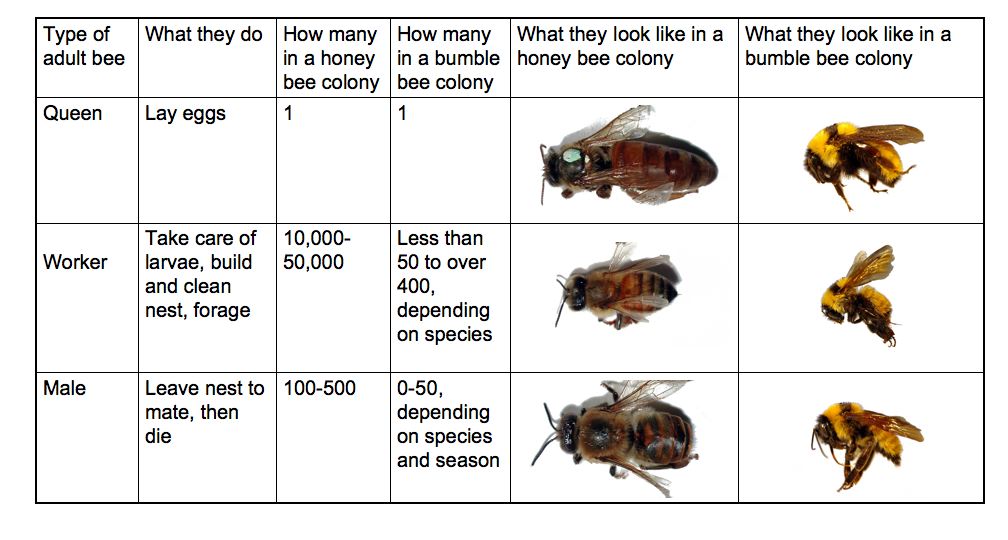
Promoting the Benefits of Pollination and Honey Production
You can imagine fields of vibrant flowers buzzing with life as bees flit from bloom to bloom, their tireless efforts ensuring the growth and production of crops that nourish our communities. But did you know that this process goes beyond just producing food? Pollination plays a vital role in maintaining biodiversity, supporting ecosystems, and even improving air quality. By promoting the benefits of pollination and honey production, we can not only support our agricultural industry but also positively impact our environment.
Marketing strategies for promoting the benefits of pollination and honey production can include educating consumers on the importance of supporting bee populations through purchasing locally sourced honey or planting bee-friendly gardens. Consumer education can focus on highlighting how increased pollination leads to more abundant crop yields, which in turn supports local farmers and provides healthier food options for communities. Additionally, emphasizing the role honey plays in alternative medicine practices such as wound healing or alleviating allergies can draw interest from health-conscious individuals looking for natural remedies. By utilizing these marketing strategies and emphasizing the value of pollinators like bees, we can create a community-driven movement towards sustainable agriculture practices that benefit both humans and nature alike.
Frequently Asked Questions
How does honey production impact the environment?
If you’re curious about how honey production impacts the environment, it’s important to consider the issue of pollinator decline. As bees and other pollinators become less common, it becomes harder for plants to reproduce and thrive. This can have a domino effect on ecosystems and even impact human food supplies. However, there are also economic benefits to honey production that shouldn’t be overlooked. In many areas, beekeeping provides jobs and income for individuals and communities. Additionally, honey itself can be sold or used in a variety of products, from cosmetics to baked goods. When managed responsibly, honey production has the potential to benefit both people and the planet.
What is the nutritional content of honey?
Have you ever wondered about the nutritional content of honey? Well, floral sources play a major role in determining the composition of this sweet treat. Honey from different flowers contain varying levels of vitamins, minerals and other bioactive compounds. Additionally, honey’s antioxidant properties can help protect your body against cell damage caused by free radicals. However, it’s important to note that honey processing and quality control can also affect its nutritional value. Ensuring high standards during these stages is crucial for maintaining the health benefits of honey. So next time you drizzle some honey on your toast or add it to your tea, take comfort in knowing that it not only tastes great but also provides some essential nutrients for overall well-being.
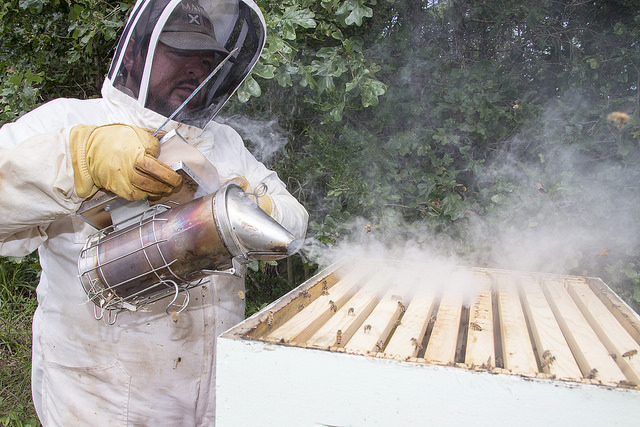
How do bees communicate with each other?
Do you ever wonder how bees communicate with each other? It’s fascinating! Bees use a variety of methods to convey information, including the famous "bee dance" and chemical signals. The bee dance is a way for bees to communicate the location of food sources or potential new hive sites. By dancing on the honeycomb in a particular pattern and orientation, worker bees can tell others where to find food or scout out new locations for their colony. Chemical signals are also important for communication between bees, as they release pheromones that can indicate danger, mark territory, or signal reproductive readiness. It’s amazing how these tiny insects have developed such sophisticated means of communication!
What are the potential health benefits of consuming honey?
You may have heard that honey is nature’s sweet gift, but did you know it also holds a world of health benefits? This golden elixir has been used for centuries as a natural remedy for everything from sore throats to wounds. Not only does honey have antibacterial properties, but it also contains antioxidants and anti-inflammatory compounds that can help boost your immune system and promote overall health. However, like any food, there are risks associated with consuming too much honey – namely an increased risk of cavities and potential allergic reactions. But in moderation, adding a dollop of this delicious nectar to your tea or toast can do wonders for your wellbeing. So go ahead and indulge in nature’s sweet medicine!
How has technology impacted the honey production industry?
If you’re curious about how honey production has changed in recent years, you might be interested to learn about the impact of modern technology and beekeeping techniques. Thanks to innovations like precision farming and hive monitoring systems, today’s beekeepers are able to produce more honey with greater efficiency than ever before. From drones that can help monitor hives remotely to robots that can extract honey without harming bees, there are a variety of cutting-edge tools being used in the industry today. And while some traditionalists may argue that these advancements take away from the artistry of beekeeping, most experts agree that they have played a critical role in helping keep our global food supply healthy and thriving.
Conclusion
Congratulations! You have now learned about the sweet science of pollination and honey production. As you have discovered, pollinators play a crucial role in our ecosystem and without them, our food sources would be severely limited. Increasing pollination has numerous benefits for both the environment and agriculture industries, resulting in higher crop yields and healthier ecosystems.
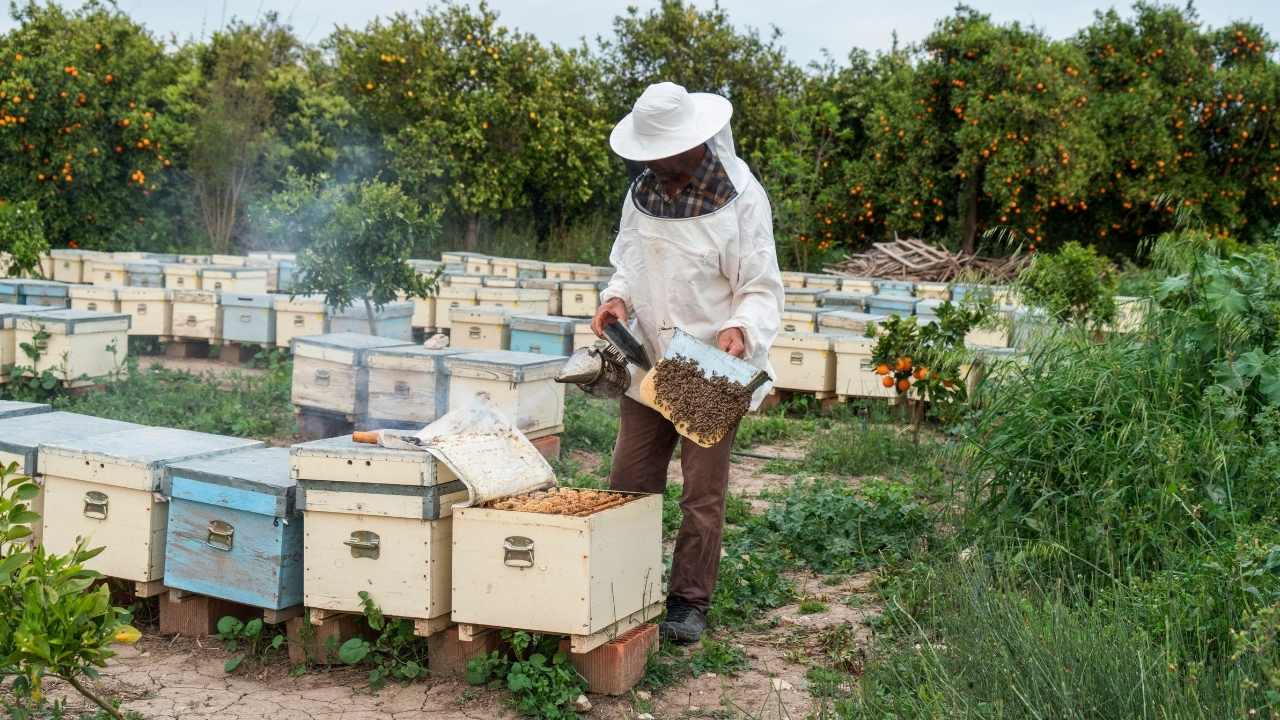
Moreover, honey production not only provides economic benefits to beekeepers but also offers medicinal properties that can boost your immune system. Honey is a versatile product with uses beyond just its culinary purposes – it can be used as a natural remedy for various ailments or as an ingredient in skincare products. The possibilities are endless when it comes to this golden liquid.
In summary, the world of pollination and honey production is fascinating and vital to our planet’s well-being. It is like a beautiful dance between flowers and bees that results in delicious honey for us all to enjoy! So next time you see a busy bee buzzing around, remember how important their work is for us all.

Roger Thomas is a seasoned beekeeper and hive architect with a deep-seated passion for sustainable living. His fascination with bees has shaped his professional career, giving him practical and theoretical expertise in bee behavior, colony health, and optimal hive conditions. Roger’s technical skills shine in his bespoke hive creations that cater to the specific needs of diverse bee species, while his sustainable practices promote environmental balance and the wellbeing of the bee population.
As he continues his journey in beekeeping, Roger has become a dedicated advocate for responsible practices and an insightful educator in his field. His posts aim to inspire new beekeepers, underline the importance of sustainability, and showcase the remarkable contribution bees make to our ecosystem. Roger invites you to join him as he delves into the world of bees and the rewarding, honey-sweet art of beekeeping.
